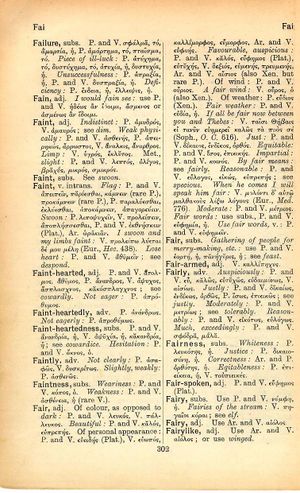faint
καὶ ὑποθέμενος κατὰ τῆς κεφαλῆς φέρειν τὰς πληγάς, ὡς ἐν ἐκείνῃ τοῦ τε κακοῦ τοῦ πρὸς ἀνθρώπους → and having instructed them to bring their blows against the head, seeing that the harm to humans ... (Josephus, Antiquities of the Jews 1.50)
English > Greek (Woodhouse)
adj.
Indistinct: P. ἀμυδρός, V. ἀμαυρός; see dim. Weak physically: P. and V. ἀσθενής, P. ἀπειρηκώς, ἄρρωστος, V. ἄναλκις, ἄναρθρος. Limp: V. ὑγρός, ἔκλυτος. Met., slight: P. and V. λεπτός, ὀλίγος, βραχύς, μικρός, σμικρός. subs. See swoon. v. intrans. Flag: P. and V. ἀπειπεῖν, παρίεσθαι, κάμνειν (rare P.), προκάμνειν (rare P.), P. παραλύεσθαι, ἐκλύεσθαι, ἀποκάμνειν, ἀπαγορεύειν. Swoon: P. λιποψυχεῖν, V. προλείπειν, ἀποπλήσσεσθαι, P. and V. ἐκθνήσκειν (Plat.), Ar. ὡρακιᾶν. I swoon and my limbs faint: V. προλείπω λύεται δέ μου μέλη (Eur., Hec. 438). Lose heart: P. and V. ἀθυμεῖν; see despond.

